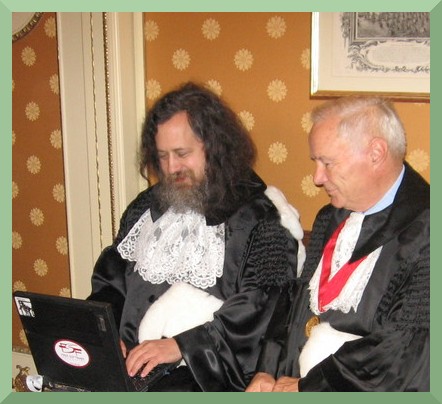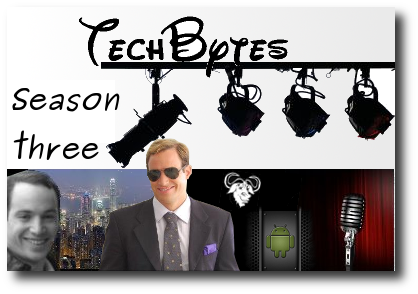Archive for July, 2013
Richard Stallman on Locational Surveillance

Direct download as Ogg (00:14:31, 8.2 MB)
Summary: Tracking in Facebook criticised; Malicious features in mobile phones (tracking and listening) are being discussed as well
THIS 84th episode speaks about phones’ exploitation for tracking and listening by authorities. For those who are not aware yet, as long as the main battery is inside a phone, or any battery at all is inside a phone (some have several batteries), then even when the phone is switched off it can be used to listen to the carrier and his/her environment. Craig Murray, a former British ambassador, says the MI5 uses this technique.
Android/Replicant are discussed, noting that they do not help resolve the above issue. One listener of TechBytes asked: “Maybe you could ask him [Stallman] about so called smartphones. Everybody knows he doesn’t use any… But can he think any condition he could think about using one. Fairphone? Phone with FirefoxOS? Prepaid SIM without registration?” Stallman said he was hypothetically thinking about getting an OpenMoko phone, but eventually decided that tracking would be unavoidable.
We hope you will join us for future shows and consider subscribing to the show via the RSS feed. You can also visit our archives for past shows. If you have an Identi.ca account, consider subscribing to TechBytes in order to keep up to date.
As embedded (HTML5):
Keywords: gnu fsf richardstallman
Download:
QuinStreet Keeps Vital GNU/Linux Sites Offline. Help Change This.
What the world needs is preservation, not de facto censorship

Summary: Please let QuinStreet understand why it should let DesktopLinux and LinuxDevices articles return to the World Wide Web
A company known as QuinStreet bought DesktopLinux and LinuxDevices almost exactly a year and a half ago, along with Ziff Davis Enterprise. As the announcement from QuinStreet put it, “QuinStreet will benefit from new and expanded relationships with some of the largest clients in the B2B technology vertical, as well as an impressive group of additional editorial professionals and expert writers.”
 But what about all the valuable news stories? Not too long ago DesktopLinux and LinuxDevices went dark. The domains were left to rot and the articles accumulated there for over a decade became inaccessible, essentially deleted from the Web. It has come to our attention, after some inquiries with relevant individuals, that people who contributed to DesktopLinux and LinuxDevices — including the founders — do wish for the content to return online of for the copyrights or the articles to be changed — explicitly or implicitly — such that all the articles can be brought back to the Web by those to whom DesktopLinux and LinuxDevices were important resources or a matter of personal contribution.
But what about all the valuable news stories? Not too long ago DesktopLinux and LinuxDevices went dark. The domains were left to rot and the articles accumulated there for over a decade became inaccessible, essentially deleted from the Web. It has come to our attention, after some inquiries with relevant individuals, that people who contributed to DesktopLinux and LinuxDevices — including the founders — do wish for the content to return online of for the copyrights or the articles to be changed — explicitly or implicitly — such that all the articles can be brought back to the Web by those to whom DesktopLinux and LinuxDevices were important resources or a matter of personal contribution.
DesktopLinux and LinuxDevices have published many thousands of high-quality articles detailing the history of GNU/Linux on desktops and in the device space, including the earlier days of Android. To let history be purged when QuinStreet has no financial incentive to do so is just counter-productive. Please write to CustomerService@QuinStreet.com to suggest that they relinquish the copyrights on articles or relicense so as to allow reposting of the articles online. This oughtn’t be complicated. This can be achieved by a single E-mail to the right people. If the company cannot provide a copy of the database (the ideal solution), then the articles can be pulled from the Web Archive and revived one by one (unless the process gets scripted). There are several people, including ourselves, who are eager to bring back exposure to articles that took many thousands of hours of work to produce. General enquiries and polite appeals can also be sent by mail to the following address:
950 Tower Lane, 6th Floor
Foster City, CA 94404
Tel: (650) 578.7700
Fax: (650) 350.1423
Help us restore two of the journals of record of the GNU/Linux community. Ask QuinStreet to collaborate on these efforts and assure the sustenance of its reputation this way. Right now the only barrier standing between the articles being online and those who want to put them online is lack of permission from QuinStreet. If QuinStreet does not want or need the articles, then why leave them offline in some dark space/room (or just on a backup tape)? Together we can promote dissemination of reliable historical information and also respect the work of many passionate people. Please let QuinStreet know how much DesktopLinux and LinuxDevices mean to you. Together we can accomplish this. Please be polite.
Making a Career From Being Racist, and How BBC Helps Promote Racism
Shame on Katherine Ryan and shame on the BBC for giving her a platform

 T IS astonishing that even in the year 2013 we have people going on TV to express racism under the guise of “it’s just a joke”. It’s offensive and it is despicable. Katherine Ryan, a Canadian comedienne who sadly enough lives in the same country as me, has decided to go all racist in the crappy quasi-corporate channel of the BBC (state propaganda funded by taxpayers but serving plutocrats from all across the globe).
T IS astonishing that even in the year 2013 we have people going on TV to express racism under the guise of “it’s just a joke”. It’s offensive and it is despicable. Katherine Ryan, a Canadian comedienne who sadly enough lives in the same country as me, has decided to go all racist in the crappy quasi-corporate channel of the BBC (state propaganda funded by taxpayers but serving plutocrats from all across the globe).
Why does the BBC help Katherine Ryan build her career based on highly offensive racist jokes in Mock the Week? The BBC merely helps characterise and stereotype Brits as arrogant racists who look down on the world, as if that perception is not already hurting the national image.
The BBC should really issue apologies and distance itself from this dirty mouth known as Katherine Ryan. Racism is the lowest form of humour and an easy way to grab laughter at the expense of the pride of other human beings. Saying “it’s just a joke” or “I’m a woman and not a racist” is not a valid excuse. People are offended by jokes that are neither funny nor constructive. Humour is not the best cure when people’s feelings are hurt, and not due to their belief in superstitions (a choice) but because of their genetics (which is not a choice).
Racism is not humour. This is 2013 we’re in. BBC, heal thyself.
Also recent in this site: Racism as a Weapon
Stallman on Privacy Policy and Law

Direct download as Ogg (00:09:59, 5.7 MB)
Summary: Stallman speaks about encryption, privacy, and data collection as the main problem
THE problem with data collection and at times indefinite retention of data in very colossal datacentres is a very real problem. The target datacentres are coupled with NSA/GCHQ/other datacentres, perhaps built with functionality to mimic the original systems (e.g. Facebook, Google search, Skype) by intercepting packets over the networks (at the exchanges), then assembling/decrypting those in private/secretive databases (based on Bill Binney’s repeated claims as an NSA whistleblower, yet to be confirmed by Snowden’s leaks).
Statements about FISA courts, national security letters, etc. are being used as a distraction from what can be characterised as direct access even though it is not direct access per se. After all, if packets get multiplexed at router-level and then stored in another, external system, then approaching companies like Microsoft, Google, Apple etc. is not even necessary. This bypasses the need for warrants, which would basically be needed only when data hoarding failed to get the entire signal (Binney estimates that about 60% of the data gets hoarded and stored in the US).
All the vague claims about foiling of terror plots, where some of the named examples were famously stopped not by the NSA but by other means, do make one wonder if there is a way to stop surveillance without getting characterised as “aiding the enemy.” Citing civil rights issues (such as indefinite detention as per NDAA 2013), I recently spoke to Stallman about data collection and found that his solution would be to limit data collection, not just retention. This recording is 10 minutes long and it deals with the topic at hand quite concisely.
We hope you will join us for future shows and consider subscribing to the show via the RSS feed. You can also visit our archives for past shows. If you have an Identi.ca account, consider subscribing to TechBytes in order to keep up to date.
As embedded (HTML5):
Keywords: gnu fsf richardstallman
Download:
Richard Stallman on the NSA (Part 5)

Direct download as Ogg (00:09:58, 7.4 MB)
Summary: Stallman speaks about security, privacy, networks, and the NSA
TODAY’S part deals with several different topics that Stallman rarely speaks about publicly. The full transcript follows.
Dr. Roy S. Schestowitz: The next bunch of things I’d like to speak about is the data, showing whole data security, I mean, security from the point of view of the user, not security from the point of view of, you know, “national security”, which could mean just about anything.
 Dr. Richard M. Stallman: I understand.
Dr. Richard M. Stallman: I understand.
RSS: The repositioning of the datacentres and the location of datacentres that companies are selecting — what role do you think that plays in privacy?
RMS: Well, if you’re going to deal with a company and it’s going to get some personal information about you and that company’s servers are hosted by a US company — whether in the US or not — then that means that the US government can get all your information.
If a country wants to provide data protection to its citizens, part of their data protection must include not permitting that data to be searched in any way as part of the company’s operations, to have [...] fully reliable and cooperating data protection. So for instance, a European company should not be allowed to host its data on an Amazon server.
RSS: There was one case way back in 2008 or so, several of us European people and people in the FFII were trying to encourage the European Commission not to put Google Analytics in its Web site. That was a public service Web site which was providing, using JavaScript, a helluva lot of details about the European citizens accessing the site to a US company. I don’t think that’s being addressed sufficiently, even now a lot of the servers…
RMS: Well, you’re certainly right and I would suggest that if a Web page is set up so that it will provide information [to] these companies, that should be treated as legally equivalent to the case where the operator of that Web page explicitly sent the same data to [these companies] and of course in Europe that would bring the European data protection rules into play and that would say, “no, you can’t send this data to Google Analytics or to some advertising network or anyone.”
RSS: I want to also ask you about encryption. I’m not sure to what degree you’re into, into all these — I suppose this is an area that enthusiasts in the field of security are very much into — but several of us people are trying to find reliable encryption, ubiquitous encryption method…
RMS: Well, I can help you find that. I know how to use the GNU Privacy Guard. However, in order to use that you’ve got to have somebody’s public key. So that’s why I was wondering if when I go to the UK we might meet and then can I could get your public key.
RSS: We’ll probably come to it later, but in the UK we have this big scandal right now about spying on diplomats in the G8 summit and that’s probably something that Russia — I read about it today — Russia is apparently going to take some legal action over it as well as the NSA leaks. There was spying on people using, basically honeypots as access points, as a way in which it would connect to a wireless access point and of course even if people are using E-mail with SSL/TLS, I’m not sure to what degree this is safe. We know WPA — WPA2 even — is crackble. And…
RMS: Well, okay, the point is, the encryption of a network hub is not something that you can depend on for your own privacy because, you know, if other people are getting on the network hub, they can listen to your packets too, so if you want to maintain your privacy, you do that with something else like communicating with SSH.
Now, the relevance of encryption on the network hub — that’s not just a way of controlling who can use it. It’s very important for people to maintain Wi-Fi networks without any kind of password, because if you don’t, then you’re becoming an enforcer in the war on sharing. One way to resist the application of unjust laws such as the Digital Economy Act is by not having a key on your Wi-Fi network.
RSS: That increases the pressure through liability claims, so…
RMS: Of course, collective responsibility is the tool of tyrants. Collective responsibility is the policy that says, if you don’t help keep everyone else subjected, we’ll punish you. Right now the UK government is using the system of collective responsibility to divide people and turn everybody into an enforcer against everybody else, and that’s why it’s people’s duty to refuse to do it.
RSS: And I suppose the same…
RMS: …Wi-Fi that works without passwords, so that they refuse to enforce the system of unjust control on everyone else.
RSS: I totally agree with you and the same was said about the solidarity when it comes to encrypting E-mail. We should make it a standard thing to encrypt our E-mails although, to tell you the truth, I mean, all the encryption methods are based upon industry standards that are accepted at the other end of the line, so when you send somebody an E-mail you have to make sure they have the same decryption methods upon which…
RMS: Right. That’s why it’s difficult, in practice, to encrypt all our E-mails. We can encrypt E-mail with people that we know and have arranged to exchange keys with. But the other thing to point out is that encrypting E-mail doesn’t disguise any of the metadata, so the NSA can still track who sends E_mail to whom, even if the contents are encrypted.
RSS: And I suppose with all the mathematicians at the NSA — they seem to be hiring quite a few very skilled people who can do analysis on the encryption methods and…
RMS: They’ve been doing that since 19…
RSS: Fifty?
RMS: 1949 or so.
RSS: I think the NSA was only founded in 19…
RMS: Well, it wasn’t then called the NSA, but it doesn’t matter. You know, details like where it’s put don’t matter.
Later today I’ll be meeting Stallman in Oxford to get some video interviews done with him. This time the audio quality will be vastly better.
We hope you will join us for future shows and consider subscribing to the show via the RSS feed. You can also visit our archives for past shows. If you have an Identi.ca account, consider subscribing to TechBytes in order to keep up to date.
As embedded (HTML5):
Keywords: gnu fsf richardstallman
Download:






 Filed under:
Filed under: 